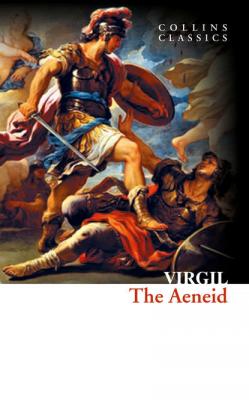The Aeneid. Публий Марон Вергилий
Читать онлайн.| Название | The Aeneid |
|---|---|
| Автор произведения | Публий Марон Вергилий |
| Жанр | Классическая проза |
| Серия | |
| Издательство | Классическая проза |
| Год выпуска | 0 |
| isbn | 9780007535293 |
These dues perform’d, we stretch our sails, and stand
To sea, forsaking that suspected land.
“From hence Tarentum’s bay appears in view,
For Hercules renown’d, if fame be true.
Just opposite, Lacinian Juno stands;
Caulonian tow’rs, and Scylacaean strands,
For shipwrecks fear’d. Mount Aetna thence we spy,
Known by the smoky flames which cloud the sky.
Far off we hear the waves with surly sound
Invade the rocks, the rocks their groans rebound.
The billows break upon the sounding strand,
And roll the rising tide, impure with sand.
Then thus Anchises, in experience old:
‘’Tis that Charybdis which the seer foretold,
And those the promis’d rocks! Bear off to sea!’
With haste the frighted mariners obey.
First Palinurus to the larboard veer’d;
Then all the fleet by his example steer’d.
To heav’n aloft on ridgy waves we ride,
Then down to hell descend, when they divide;
And thrice our galleys knock’d the stony ground,
And thrice the hollow rocks return’d the sound,
And thrice we saw the stars, that stood with dews around.
The flagging winds forsook us, with the sun;
And, wearied, on Cyclopian shores we run.
The port capacious, and secure from wind,
Is to the foot of thund’ring Aetna join’d.
By turns a pitchy cloud she rolls on high;
By turns hot embers from her entrails fly,
And flakes of mounting flames, that lick the sky.
Oft from her bowels massy rocks are thrown,
And, shiver’d by the force, come piecemeal down.
Oft liquid lakes of burning sulphur flow,
Fed from the fiery springs that boil below.
Enceladus, they say, transfix’d by Jove,
With blasted limbs came tumbling from above;
And, where he fell, th’ avenging father drew
This flaming hill, and on his body threw.
As often as he turns his weary sides,
He shakes the solid isle, and smoke the heavens hides.
In shady woods we pass the tedious night,
Where bellowing sounds and groans our souls affright,
Of which no cause is offer’d to the sight;
For not one star was kindled in the sky,
Nor could the moon her borrow’d light supply;
For misty clouds involv’d the firmament,
The stars were muffled, and the moon was pent.
“Scarce had the rising sun the day reveal’d,
Scarce had his heat the pearly dews dispell’d,
When from the woods there bolts, before our sight,
Somewhat betwixt a mortal and a sprite,
So thin, so ghastly meager, and so wan,
So bare of flesh, he scarce resembled man.
This thing, all tatter’d, seem’d from far t’ implore
Our pious aid, and pointed to the shore.
We look behind, then view his shaggy beard;
His clothes were tagg’d with thorns, and filth his limbs besmear’d;
The rest, in mien, in habit, and in face,
Appear’d a Greek, and such indeed he was.
He cast on us, from far, a frightful view,
Whom soon for Trojans and for foes he knew;
Stood still, and paus’d; then all at once began
To stretch his limbs, and trembled as he ran.
Soon as approach’d, upon his knees he falls,
And thus with tears and sighs for pity calls:
‘Now, by the pow’rs above, and what we share
From Nature’s common gift, this vital air,
O Trojans, take me hence! I beg no more;
But bear me far from this unhappy shore.
’Tis true, I am a Greek, and farther own,
Among your foes besieg’d th’ imperial town.
For such demerits if my death be due,
No more for this abandon’d life I sue;
This only favor let my tears obtain,
To throw me headlong in the rapid main:
Since nothing more than death my crime demands,
I die content, to die by human hands.’
He said, and on his knees my knees embrac’d:
I bade him boldly tell his fortune past,
His present state, his lineage, and his name,
Th’ occasion of his fears, and whence he came.
The good Anchises rais’d him with his hand;
Who, thus encourag’d, answer’d our demand:
‘From Ithaca, my native soil, I came
To Troy; and Achaemenides my name.
Me my poor father with Ulysses sent;
(O had I stay’d, with poverty content!)
But, fearful for themselves, my countrymen
Left me forsaken in the Cyclops’ den.
The cave, tho’ large, was dark; the dismal floor
Was pav’d with mangled limbs and putrid gore.
Our monstrous host, of more than human size,
Erects his head, and stares within the skies;
Bellowing his voice, and horrid is his hue.
Ye gods, remove this plague from mortal view!
The joints of slaughter’d wretches are his food;
And for his wine he quaffs the streaming blood.
These eyes beheld, when with his spacious hand
He seiz’d two captives of our Grecian band;
Stretch’d on his back, he dash’d against the stones
Their broken bodies, and their crackling bones:
With spouting blood the purple pavement swims,
While the dire glutton grinds the trembling limbs.
“‘Not unreveng’d Ulysses bore their fate,
Nor thoughtless of his own unhappy state;
For, gorg’d with flesh, and drunk with human wine
While
